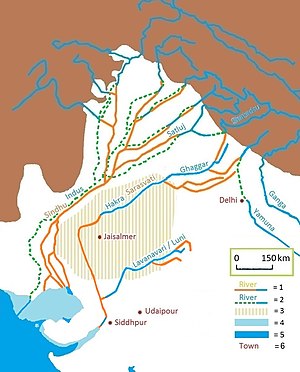Hakra River
| Ghaggar-Hakra River | |
|---|---|

Ghaggar river in Panchkula
|
|

Course of the Ghaggar-Hakra (Sarasvati) river in the fourth millennium BCE
1=ancient river 2=today's river |
|
| Native name | घग्गर-हाकरा नदी/ ਘੱਗਰ-ਹਕੜਾ ਨਦੀ |
| Country | India, Pakistan |
| Basin features | |
| Main source | Shivalik Hills, Himachal Pradesh |
| River mouth | Ottu, Haryana |
| Tributaries |
|
| Waterbodies | Kaushalya Dam, Ottu barrage |
| Physical characteristics | |
| Discharge |
|
1=ancient river 2=today's river
3=today's Thar desert 4=ancient shore
The Ghaggar-Hakra River is an intermittent, endorheic river in India and Pakistan that flows only during the monsoon season. The river is known as Ghaggar before the Ottu barrage and as the Hakra downstream of the barrage.
The basin is classified in two parts, Khadir and Bangar, the higher area that is not flooded in rainy season is called Bangar and the lower flood-prone area is called Khadar.
Nineteenth and early 20th century scholars, but also more recent authors, have suggested that the Ghaggar-Hakra might be the defunct remains of the mythological Sarasvati of the Rig Veda. Recent geophysical research does not support this idea. It shows that the Ghaggar-Hakra system was not sourced by the glaciers and snows of the Himalayas, but rather by a system of perennial monsoon-fed rivers. Late Holocene aridification subsequently reduced the Ghaggar-Hakra to the seasonal river it is today.
The Ghaggar is an intermittent river in India, flowing during the monsoon rains. It originates in the village of Dagshai in the Shivalik Hills of Himachal Pradesh at an elevation of 1,927 metres (6,322 ft) above mean sea level and flows through Punjab and Haryana states into Rajasthan; just southwest of Sirsa, Haryana and by the side of Talwara Lake in Rajasthan.
...
Wikipedia
